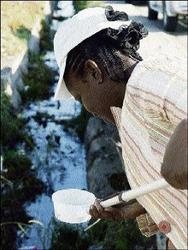
Eulalee ThompsonHere's a post-disaster survival kit especially for families in the eastern and southern parishes (including communities in Kingston and St. Andrew) hit hardest by furious Hurricane Dean last Sunday.
Survival measures after a disaster always focus on basic needs - clean water, nourishment, light and of course, mental health services.
CLEAN WATER
Boiling water
Most environmental agencies indicate that any disease-causing microrganisms and parasites can be killed by the vigorous boiling of water for at lease one minute (or longer depending on the quantity of water.
Method:
Place water in a covered pot (to shorten boiling time and conserve on fuel). Bring water to a rolling boil and keep it boiling (bubbling up) for several minutes to kill germs.
Boiled water may taste flat; improve the taste through aeration, that is, by just pouring the water back and forth from one clean container to another you can improve the taste of boiled water by allowing it to stand, for a few hours, in a closed container or by adding a pinch of salt to each quart (about a litre) of water.
Use bleach
If boiling your water is not possible, it can also be disinfected using common household bleach.
Method:
Place only two drops of bleach to each quart container of water, eight drops to each gallon and about half teaspoon to each five-gallon container; mix well and leave treated water standing, preferably covered, for 30 minutes.
Don't be alarmed by the slight chlorine odour coming from the water, public health specialists in fact indicate that this odour is desirable. If there is no chlorine odour then repeat the procedure with the same dosage and allow water to stand for an additional 15 minutes. If the taste of chlorine is too strong, you can improve the treated water taste by allowing the water to stand for a few hours or aerating it (as described above).
PREVENT waterbourne DISEASES

Sherine Huntley, medical entomologist at the Ministry of Health, testing the mosquito breeding ground in a gully on Marcus Garvey Drive in Kingston recently.Norman Grindley/Deputy Chief Photographer
Using unsafe water can cause waterborne diseases such as gastroenteritis. Handling food with unwashed hands can pass on germs connected to typhoid fever. Purify and disinfect water for drinking and washing hands, dishes, utensils, fruits and vegetables.
Stagnant water is a breeding ground for mosquitoes and many types of these insects carry diseases such as dengue fever and malaria. Rodents such as rats thrive in unclean environments; they spread leptospirosis. Seek medical help if you feel unwell.
SAFE LIGHTS
Lamps, lantern, candles and generators come in handy post-disaster. There are safety measures to follow to avoid stacking disaster upon disaster. Already, one elderly woman lost her life, post-Dean, when an unattended candle started a fire that eventually burnt down her home. Candles should be monitored and placed away from flammable objects and surfaces.
On the matter of generators, Winsome Callum, corporate communications managerof the Jamaica Public Service Company (JPS), has repeated over and over that they should be professionally installed with the proper switch to prevent feedback into the power grid that could place yourself and JPS workers at risk.
Distributors of generators recommend that they be placed away from occupied areas of your house; ensure that exhaust fumes are not carried into the home (these fumes contain carbon monoxide, the silent killer). Also, don't overload the generator - a small one shouldn't be used to do large jobs. Diesel generators may be more expensive than the gasoline-powered ones but diesel is less volatile.
eulalee.thompson@gleanerjm.com

